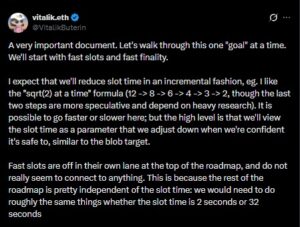In the race to build the decentralized future, choosing the right programming language isn’t just a technical decision — it’s a strategic one. As Web3 matures from speculative hype into robust infrastructure, developers are faced with a pivotal question: Solidity, Rust, or Vyper? Each of these languages powers some of the most influential blockchains and protocols, but they come with their own strengths, quirks, and trade-offs.
So, how do you choose the right tool for the job in this ever-expanding Web3 ecosystem? Let’s break it down.
The Triumvirate of Web3 Development
Before diving deep, let’s understand the lay of the land:
- Solidity is the most widely-used language for smart contracts, primarily on Ethereum and Ethereum-compatible chains.
- Rust powers high-performance blockchains like Solana and Polkadot and is rapidly gaining traction for its speed and safety.
- Vyper is a newer Ethereum-compatible language focused on simplicity, security, and auditability.
Each language is carving out a niche, attracting different types of developers, and shaping the future of decentralized applications (dApps) in unique ways.
Solidity: The Veteran of Ethereum Smart Contracts
🔍 The De Facto Web3 Language
Solidity is often called the “JavaScript of Web3”—not because of syntax, but because of its dominance. Developed specifically for Ethereum, it’s the most battle-tested and widely adopted smart contract language in existence.
✅ Why Developers Love Solidity:
- Massive Ecosystem: If you’re building on Ethereum or an EVM-compatible chain like Polygon, BNB Chain, or Arbitrum, Solidity is the gold standard.
- Resources Galore: Countless tutorials, libraries (like OpenZeppelin), and community support.
- Developer Tools: Frameworks like Hardhat, Truffle, and Foundry streamline testing, deployment, and debugging.
⚠️ Challenges:
- Complex Syntax: Solidity borrows from JavaScript and C++, which can be tricky for beginners.
- Security Concerns: Known vulnerabilities like reentrancy and integer overflows require strict coding discipline and thorough audits.
“Solidity may be the easiest to start with, but the hardest to master securely.”
If you’re aiming to build DeFi protocols, NFT platforms, or DAOs on Ethereum, Solidity is practically a must.
Rust: The Powerhouse for Next-Gen Blockchains
🚀 High Performance, High Safety
Rust has been around since 2010, but its emergence in blockchain development is relatively recent — and explosive. Solana, Polkadot, NEAR Protocol, and even Cosmos SDK all rely heavily on Rust.
✅ Why Developers Choose Rust:
- Speed and Efficiency: Rust offers near-C-level performance, perfect for high-throughput chains like Solana.
- Memory Safety: Rust’s compiler enforces strict safety rules, drastically reducing runtime errors.
- Growing Ecosystem: Cargo (its package manager) and native libraries offer increasing flexibility for dApp development.
⚠️ Challenges:
- Steep Learning Curve: Rust is not beginner-friendly. Concepts like lifetimes and borrowing can intimidate newcomers.
- Longer Development Time: The strict compiler forces you to write robust code, but that can slow development.
“If Solidity is the hammer, Rust is the Swiss army knife — powerful, versatile, but requires practice.”
Rust is ideal if you’re building on Solana or want to contribute to the core development of newer Layer 1s. It’s not just about writing dApps — it’s about shaping the foundational layers of the blockchain itself.
Vyper: The Minimalist Built for Security
🛡️ Security-First Development
Vyper is a Pythonic alternative to Solidity for Ethereum smart contracts. It’s designed with security and auditability at its core, often chosen by developers building mission-critical contracts with minimal risk tolerance.
✅ Why Vyper Appeals to Some Developers:
- Readable Syntax: Inspired by Python, Vyper’s syntax is clean, concise, and beginner-friendly.
- No Hidden Magic: Vyper removes features that can lead to obscure bugs (e.g., function overloading, inheritance).
- Auditability: Simpler code is easier to audit — a major plus for DeFi protocols handling large sums.
⚠️ Challenges:
- Limited Functionality: Vyper deliberately omits advanced features to keep contracts simple.
- Smaller Community: Fewer resources, libraries, and tooling compared to Solidity.
- Slower Updates: Development on Vyper has historically lagged behind other languages.
“When security is non-negotiable, Vyper becomes your best friend — even if it’s not flashy.”
Vyper is well-suited for developers building contracts with high audit requirements, such as vaults, treasuries, or time-locked contracts.
Choosing the Right Language: What’s Your Use Case?
Let’s look at some scenarios:
| Use Case | Recommended Language |
|---|---|
| dApp on Ethereum/Polygon | Solidity |
| Building on Solana | Rust |
| Developing secure DeFi contracts | Vyper |
| Contributing to Polkadot or NEAR | Rust |
| Quick prototyping for EVM | Solidity or Vyper |
The choice of language is tightly coupled with your target blockchain, security requirements, and your own background in programming. A Python developer may find Vyper more intuitive, while a systems-level developer might thrive with Rust.
Cross-Chain Compatibility: A Future Worth Preparing For
As Web3 heads toward interoperability, developers may soon need to be fluent in more than one language. Projects like Polkadot and Cosmos are emphasizing cross-chain communication, while Layer 2s and rollups are building bridges to Ethereum.
“Tomorrow’s most successful Web3 developers won’t just master a language—they’ll master ecosystems.”
Final Thoughts: Build What Matters
At the end of the day, the best language is the one that lets you ship meaningful, secure, and scalable applications. Whether you prefer Solidity’s reach, Rust’s power, or Vyper’s security-focused simplicity, the Web3 space has a place for you.
If you’re new to the space, start with Solidity to get a feel for smart contracts and EVM-compatible chains. But if you’re serious about performance or contributing to blockchain infrastructure, don’t shy away from Rust. And if security is your top concern, give Vyper a shot.
In Web3, code isn’t just code. It’s trust. It’s value. It’s governance. So, choose wisely.









